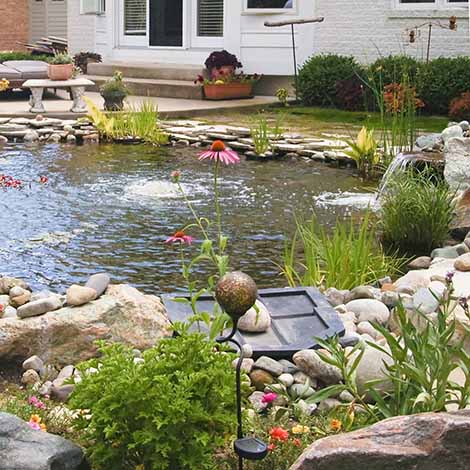Asked By: Aaron of Covington, KY
Everyone is looking for ways to save money on their monthly bills. You might think that turning off your pond’s pump every night is one way to stretch some of your hard-earned cash. The truth is, you won’t save much money, and doing so could damage your water quality. It’s best to keep your pump running continuously when temperatures are above freezing, so keep reading to learn why.
Are Pond Pumps Expensive to Run?
The cost of running a pond pump 24/7 compared to shutting it off at night is negligible. Even the largest pumps powering roaring waterfalls only cost a few cents per hour, so you won’t save much by turning them off overnight.
Pond pump manufacturers understand that water gardeners are concerned about operating costs, so many of the designs on the market today are energy efficient and consume relatively little electricity.
For example, the powerful SuperFlo 9000 GPH Waterfall Pump costs under ten cents per hour, while the lighter-duty SolidFlo G2 600 GPH Submersible Pump costs a mere half-cent per hour. Shutting them off at night would save less than a dollar a day, and the troubles caused by lack of circulation just aren’t worth it.
Benefits of Continuously Running Pond Pumps
If you shut your pond pump down each night, it will likely be detrimental to your pond's water quality and fish health. In the long run, these issues could cost you much more than the sparse savings. Check out these top reasons why you should keep your pond pump running all the time:
- Filtration: For your filtration system to function properly, water must flow through it. When your pump is off, the water is not moving or being filtered, creating unpleasant conditions for your pond's inhabitants. Plus, if the filter drains and the media dries, you could lose the beneficial bacteria colonies that work hard cleaning the water.
- Settled Debris: Movement helps keep debris suspended in the water column, where it gets pulled through the skimmer and filter for efficient removal. When the pump is turned off, debris settles to the bottom of the pond and accumulates, feeding algae and leading to muck issues.
- Oxygen Depletion: Water that sits stagnant—even briefly overnight—cannot circulate and exchange toxic gases with oxygen-rich air at the pond's surface. Moving water molecules continually churn to the surface to off-gas noxious ammonia and carbon dioxide and absorb life-sustaining oxygen.
If you still feel like you should shut down your pump each night, at least keep an aeration system running to keep the water circulating. Aeration consumes even less electricity than a pump, costing only pennies per month.
More on How to Run a Pond Pump
Pumps and filters are essential components of a thriving, balanced pond ecosystem. There’s a lot to learn, so if you still have questions, please contact us at 866-POND-HELP. Our pond professionals can help you get the most out of your water garden oasis.
Want to read more about pond pumps? Check out these related articles:
How to Choose a Pond Pump
Choosing a Pump for UV Clarifiers
Find the Right Fitting
How to Choose Tubing Size for Fountain Pumps
Can I leave pond pumps running in the winter?
Last Updated: June 3, 2024

